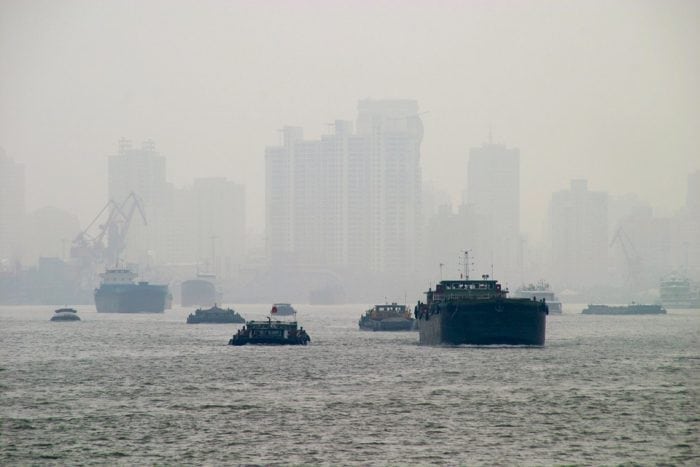
A new study done by an international team of researchers and published in the journal Proceedings of the National Academy of Sciences implies that air pollution has lead to a reduction in intelligence in many regions of the world. Though the data was collected from China, the findings of the study could have implications far beyond China’s borders as 95% of the world is believed to breathe air tainted with unsafe levels of pollution.
Assessing Health Impacts Of Air Pollution
The researchers who worked on the study claim that high levels of air pollution can negatively impact people’s arithmetic and language scores on standardized tests. The general impact of the pollution is so severe that cognitive losses are approximately equivalent to one lost year of an average person’s education.
Xi Chen, a member of the research team from the Yale School of Public Health, explains that while the effects of air pollution on cognitive development and performance are approximately equal to a lost year of education, the effect is pronounced for men and the elderly. Men see more damage from air pollution when compared to women, and those over the age of 64 also experience more damage from air pollution.
It’s well known that air pollution is harmful to people’s health, with the World Health Organization estimating that air pollution causes some six to seven million premature deaths every year. Air pollution has been correlated with a noticeable jump in mortality in both children with mental illness and adults with mental illness. Those who live near large sources of air pollution are also more likely to develop brain disorders like dementia. Previous studies done on the health effects of air pollution have determined that polluted air negatively impacts the performance of students and office workers, but this is the first large-scale study to examine how air pollution affects all age demographics, as well as the first study to examine how air pollution harms men and women differently.

Photo: 3dman_eu via Pixabay, CC0
The deleterious effects of air pollution on the elderly pose special cause for concern, but the years surrounding 64 years of age are when people often make their most critical financial decisions regarding their old age.
To determine that air pollution negatively affects one’s cognitive abilities, the researchers did a large-scale observational study that examined the impact of air pollution on the test scores of people across China. The researchers analyzed the scores (arithmetic and language scores) of approximately 20,000 people from various regions of China who took tests between the years of 2010 to 2014. The researchers then compared these tests scores with geographical data that reflected concentrations of sulfur dioxide and nitrogen dioxide air pollution.
Apart from sulfur dioxide and nitrogen dioxide, other air pollutants that harm people’s health and cognition include carbon monoxide and particulate matter. Particulate matter doesn’t refer to any one type of pollutant, rather it’s an umbrella term that describes tiny particles of pollutants, some of which are as small as 2.5 microns (micrometers) across. Particulate matter can be made out of both liquid and solid particles and it is often so small that it can penetrate people’s lungs and bloodstream, doing damage to the body. Particulate matter exposure has not only been correlated with higher rates of lung disease and lung cancer, but also cognitive impairments.
Decreased Cognitive Performance From Air Pollution
The researchers found that the longer that an individual was exposed to air pollution, the more likely the individual was to show decreased performance on math and language tests. As previously mentioned, this effect was more pronounced in men, whose mathematical abilities saw a greater reduction than the abilities of women, despite similar levels of exposure to air pollution. The researchers hypothesize that this effect could result from the differences in the structures of female and male brains.

Photo: StockSnap via Pixabay, CC0
A researcher at Hong Kong Polytechnic University, Derrick Ho, explained that the effects of toxic air on cognitive abilities are important to continue studying because of the myriad of conditions that can arise from air pollution, many of which are neurodegenerative or neuroinflammatory in nature.
The researchers also believe that the air pollution isn’t merely correlated with a drop in intelligence, but is actually the cause of it. The researchers believe this because the study tracked the same people throughout the years, even as air pollution levels changed from one year to the next. This allowed the researchers to account for many of the other variables that could have influenced the outcome, such as differences in lifestyle and genetics. The research team also took into account the normal cognitive declines people experience as they age. They even accounted for temperamental changes, such as air pollution causing people to be more impatient when testing.
In addition to the long-term consequences of air pollution, air pollution also has a more short-term impact on people’s cognitive abilities, which could have significant consequences in certain circumstances, such as important exams being held on days with high pollution.
Dealing With Air Pollution
As for what can be done to resolve the pollution problem and put a stop to many of the damaging effects pollution has on people’s cognition, Chen thinks that there’s no shortcuts to solving the problem, there’s simply a need for government action. Chen explains:
…There is no shortcut to solve this issue. Governments really need to take concrete measures to reduce air pollution. That may benefit human capital, which is one of the most important driving forces of economic growth.

Photo: Free-Photos via Pixabay, CC0
The World Health Organization’s data shows that the most polluted cities in the world are mainly in developing nations, and several of those cities are in China, which has been aggressively pursuing methods to reduce pollution over the past half decade. Other countries could examine what has worked, and what hasn’t worked, in China and apply the lessons to reducing their own pollution. For instance, the UK currently struggles with massive air pollution from road traffic affecting residential areas, and new policies/technologies could be informed by China’s studies and policies. Germany and other European countries are also aiming to reduce air pollution.
Chen says it’s important for other countries to take the results of the China study to heart, because the damage that pollution does to people’s brains is “the same wherever you live,” adding that “…as human beings we have more in common than is different.”









